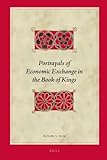Portrayals of Economic Exchange in the Book of Kings.
Material type: TextSeries: Biblical interpretation series ; v. 112.Publication details: Leiden : BRILL, 2012.Description: 1 online resource (236 pages)Content type:
TextSeries: Biblical interpretation series ; v. 112.Publication details: Leiden : BRILL, 2012.Description: 1 online resource (236 pages)Content type: - 9789004224162
- 9004224165
- 222.5067
- BS1335.6.E35 .N836 2012
- online - EBSCO
| Item type | Current library | Call number | URL | Status | Notes | Barcode | |
|---|---|---|---|---|---|---|---|
 eBook
eBook
|
Biblioteca "Angelicum" Pont. Univ. S.Tommaso d'Aquino Nuvola online | online - EBSCO (Browse shelf(Opens below)) | Online access | Not for loan (Accesso limitato) | Accesso per gli utenti autorizzati / Access for authorized users | (ebsco)439999 |
Acknowledgments; Abbreviations; Chapter One The Economies of Ancient Israel; 1.1. Presuppositions and Methods; 1.2. The Text of Kings as a Source; 1.3. The Text of Kings as History; 1.4. The Economies of Ancient Israel: A Survey of Research; 1.5. Conclusions; Chapter Two Economic Anthropology; 2.1. Theories of Political Economy; 2.1.a. Classical Political Economy; 2.1.b. Karl Marx; 2.1.c. Max Weber; 2.2. The Pioneering Economic Anthropologists; 2.3. Karl Polanyi; 2.3.a. The Great Transformation; 2.3.b. Reciprocity; 2.3.c. Redistribution; 2.3.d. Market Exchange.
2.3.e. The Problem of Terminology2.4. Reactions to Polanyi; 2.4.a. Economic Anthropology; 2.4.b. Assyriology; 2.4.c. The Informal Economy; 2.4.d. Biblical Studies; 2.5. Summary and Conclusions; Chapter Three Symmetrical Reciprocity in the Book of Kings; 3.1. Reciprocity in the Ancient Near East; 3.2. Reciprocity among Polities; 3.2.a. King Solomon and King Hiram of Tyre; 3.2.b. King Solomon and the Queen of Sheba; 3.2.c. Hezekiah and Merodach-Baladan; 3.3. Non-elite Reciprocity; 3.3.a. Refusing Reciprocity to Subvert; 3.3.b. Offering Reciprocity to Empower.
3.3.c. Non-Elite Reciprocity as Informal Economy3.3.d. Historical Considerations; 3.4. Summary and Conclusions; Chapter Four Asymmetrical Redistribution in the Book of Kings; 4.1. The Redistributive Economy in Pre-Exilic Israel; 4.1.a. Iron Age IIA (980-840/830 bce): State Formation; 4.1.b. Iron Age IIB (840/830-732/701 bce): Neo-Assyrian Threat; 4.1.c. Iron Age IIC (732/701-605/587 bce): Foreign Hegemony; 4.2. State Redistribution; 4.2.a. Solomonic Redistribution; 4.2.b. Temple Redistribution; 4.2.c. The Exception to State Redistribution: Patrimonial Land; 4.3. International Redistribution.
4.3.a. The Items of Tribute4.3.b. The Ideology of Tribute; 4.4. Theoretical Reconsiderations: The Reciprocity of Redistribution; 4.5. Summary and Conclusions; Chapter Five Market Exchange in the Book of Kings; 5.1. Did Ancient Israel Know Price-Determining Markets? The State of the Question; 5.2. Possible References to Market Exchange; 5.2.a. 1 Kings 9:26-28; 10:11-12, 22, 28-29: Solomon's Long-Distance Trade; 5.2.b. 1 Kings 20:34: Israelite Merchants in Damascus; 5.2.c. 2 Kings 6:24-25; 7:1-18: Price Movements in Besieged Samaria; 5.2.d. 2 Kings 4:1-7: The Widow's Sale of Oil.
5.3. References to Silver5.4. Did Israel Know Price Setting Markets?; 5.5. Summary and Conclusions; Chapter Six A Social Analysis of Exchange in the Book of Kings; 6.1. Ancient Israel as a Mixed Economy; 6.2. Ancient Israel as an Informal Economy; 6.3. The Economic System of Israel and Judah; 6.3.a. The Local Economy; 6.3.b. The International Economy; Chapter Seven Summary and Conclusions; 7.1. Overall Summary and Conclusions; 7.2. Directions for Future Research: Post-exilic Portrayals of Economic Exchange; Select Bibliography; Index of Ancient Sources; Index of Modern Authors; Subject Index.
Drawing on the Polanyian categories of reciprocity, redistribution and market trade, this book examines the exchange narratives within 1 and 2 Kings in an effort to clarify the nature of the economic structures behind the biblical text.
Print version record.
Includes bibliographical references and indexes.


